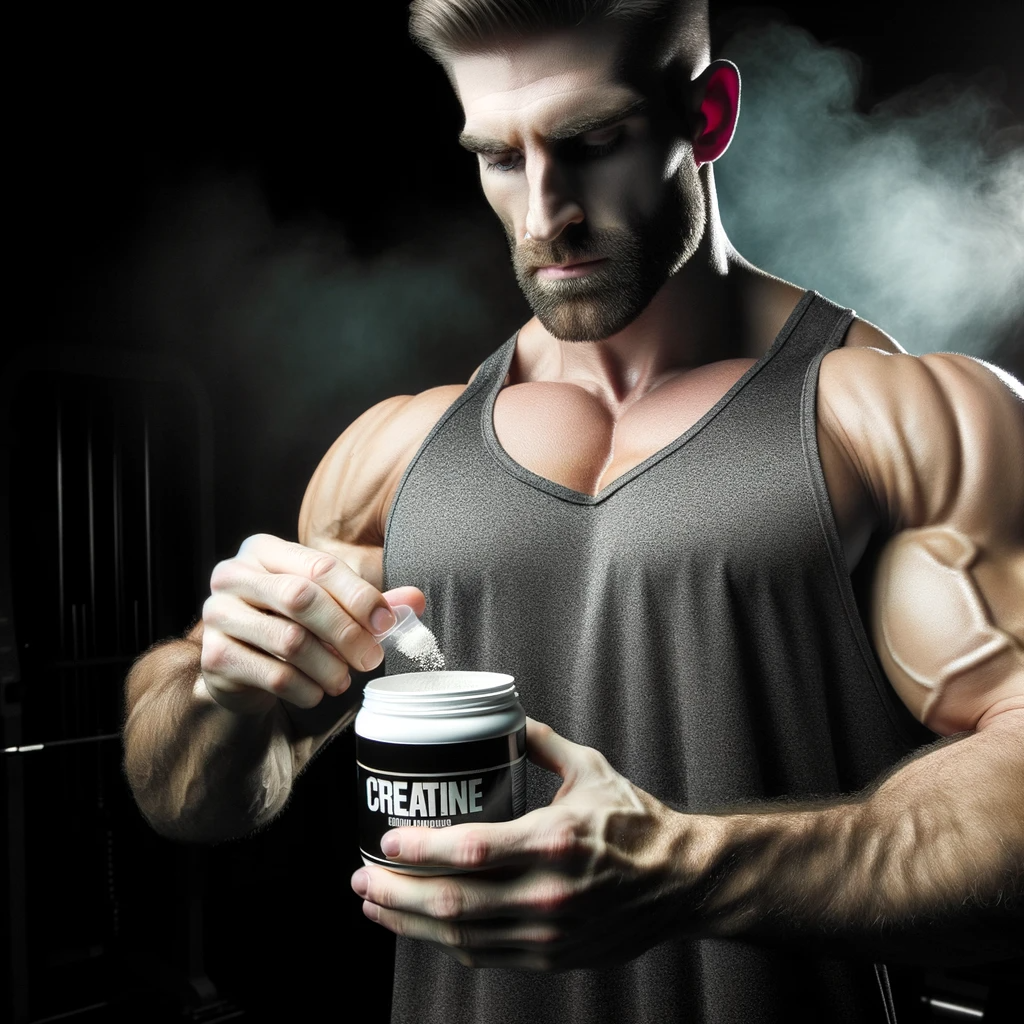
You're pumped, ready to hit the gym, and eyeing that container of pre-workout supplement on your kitchen counter.
It promises to boost your energy, focus, and even muscle gains.
But how much of that is marketing hype, and how much is backed by science?
In this comprehensive guide, we'll break down what pre-workout supplements are, what they contain, and, most importantly, whether they can help you build muscle.
We'll also tackle frequently asked questions and common misconceptions so that you can make an informed decision.
Pre-workout supplements are popular for those looking to amplify their gym experience, but their role in muscle building is often misunderstood.
While they can enhance your performance and focus, they are not a direct route to gaining muscle mass.

Pre-workout supplements blend ingredients designed to boost your energy and focus during workouts.
Research shows that these supplements can improve your performance but aren't a one-stop solution for muscle growth.
Muscle building is a complex process involving exercise, diet, rest, and overall lifestyle.
Pre-workouts can contain various formulas and mixes of ingredients.
While some may contain around 20g-30g of active ingredients, there are also smaller formulas that can contain far fewer ingredients.
Caffeine is a common ingredient in pre-workouts. It's a stimulant that boosts your energy levels and helps you focus better.
However, too much caffeine can lead to jitters or insomnia.
Amino acids are the building blocks of protein, essential for muscle repair and growth.
They can help improve your endurance and reduce muscle fatigue.
Creatine is another popular ingredient that can improve strength and power during high-intensity workouts.
It helps your muscles produce more energy during heavy lifting or sprinting.
One study shows pre-workout supplements can improve endurance and reduce muscle fatigue.
This means you can lift heavier and perform more reps, which is crucial for muscle growth.
However, these benefits are most effective when combined with a proper diet and exercise regimen.
The mental aspect is often overlooked but is crucial in any fitness journey.
Research shows pre-workouts can improve your mental focus and motivation, helping you push through the last few reps that make all the difference in muscle building.
You've seen them on the shelves of your local supplement store, and you've probably heard gym buddies rave about them.
Pre-workout supplements are everywhere, promising to take your workouts to the next level.
But can they help you build muscle?
The answer lies in the ingredients.
Each component plays a unique role, from caffeine's energizing effects to betaine's muscle endurance benefits and the proven power of creatine.
We'll dissect the science behind these ingredients to reveal how pre-workouts can be a game-changer in your muscle-building journey.
Caffeine is a staple in most pre-workout supplements, and for a good reason.
It's not just about keeping you awake; caffeine can help you push harder during workouts.
Research shows caffeine can increase your endurance and reduce perceived effort, allowing you to lift heavier and perform more reps.
This, in turn, creates the muscle stress necessary for growth during the recovery phase.
Betaine is another ingredient you'll often find in pre-workout formulas.
One study shows that betaine can improve your muscle endurance and increase the quality of your repetitions.
This means you can perform more high-quality reps, crucial for hypertrophy or muscle growth.
Creatine is perhaps the most researched and validated ingredient for muscle building.
It helps rapidly produce ATP, the cell's energy currency, allowing for better performance in high-intensity, short-duration workouts.
This is particularly beneficial for activities like weightlifting, where quick bursts of energy are needed.
The more you can lift, the more stress you put on your muscles, leading to more significant muscle gains during recovery.

Beta-Alanine is known for that 'tingling' sensation it gives, but its benefits go beyond skin-deep.
It helps buffer the acid in your muscles during high-intensity exercise, allowing you to perform better for longer.
This study shows that beta-alanine can improve performance during high-intensity interval training (HIIT), which is excellent for muscle building and fat loss.
Mushroom-based ingredients like Cordyceps are gaining popularity for their potential to improve athletic performance and energy production.
While research is still in its infancy, preliminary studies suggest that these natural ingredients can boost energy and even improve oxygen utilization, which could benefit endurance and muscle growth.
It's not just about the individual ingredients but how they work together.
A well-formulated pre-workout can provide a synergistic effect where the benefits of each ingredient are amplified, providing you with the optimal environment for muscle growth.
Pre-workout supplements can be a valuable tool in your muscle-building arsenal.
They contain various ingredients designed to boost your performance, endurance, and focus in the gym, allowing you to work harder and build muscle more effectively.
However, it's crucial to remember that supplements are just that—a supplement to a well-rounded diet and exercise regimen.
Pre-workout supplements can be a game-changer for your fitness routine, but they're not without their caveats.
Here's what you need to know about potential side effects and interactions.
Caffeine is a common ingredient in pre-workouts, known for its energy-boosting properties.
However, too much caffeine can lead to jitters, insomnia, and even heart issues like sinus tachycardia, as reported in a study.
Safe Amount: The consensus is to keep caffeine intake below 400mg per day.
This aligns with the findings of a study that discusses the safety assessment of caffeinated energy drinks.
Betaine is another common ingredient that can improve muscle endurance.
However, excessive amounts can lead to stomach upset.
Safe Amount: The recommended dosage is around 1.25 to 2.5 grams per day.
Creatine is well-known for its muscle-building benefits.
However, it can cause water retention and, in rare cases, kidney issues.
Safe Amount: A study confirms that a daily intake of 5 grams is generally safe for most people.
Beta-Alanine can improve muscle endurance but may cause tingling sensations in some people.
Safe Amount: A study suggests that 2 to 5 grams per day is safe and effective.
Mushroom-based ingredients like Reishi and Cordyceps are gaining popularity for their potential to improve stamina and reduce fatigue.
However, more research is needed to establish their safety profile.
If you're taking other supplements or medications, it's crucial to consult a healthcare provider.
Some pre-workout ingredients can interact with medications and other supplements, leading to adverse effects.

Given that pre-workout supplements are not FDA-regulated, always opt for reputable brands.
A study emphasizes the need for transparency in the actual composition of labels to ensure safety and effectiveness.
While pre-workout supplements can give you that extra edge in the gym, they're not a standalone solution for muscle growth.
A balanced diet rich in protein and consistent strength training are equally, if not more, important.
Research shows that protein is essential for muscle repair and growth, and strength training is the catalyst that stimulates muscle hypertrophy.
Think of pre-workouts, diet, and exercise as a trifecta that works best when optimized together.
Each component amplifies the effectiveness of the others, creating a well-rounded approach to muscle building.
Let's talk money.
Quality pre-workout supplements often come with a hefty price tag.
While it's tempting to go for cheaper alternatives, remember that you often get what you pay for.
High-quality ingredients that are backed by science will cost more but are likely to be more effective.
Before splurging, weigh the benefits against the cost.
Ask yourself if the incremental gains you expect to achieve with the supplement are worth the financial investment.
If you're serious about muscle building and believe that a pre-workout can help you reach your goals faster, it might be a worthy investment.
One crucial thing to note is that the FDA does not regulate pre-workout supplements.
This lack of regulation can lead to inconsistencies in quality and even potential health risks.
Always opt for reputable brands with good reviews and transparent ingredient lists to mitigate this.
Some companies even provide third-party testing results for their products.
Doing your due diligence before purchasing can save you from wasting money and, more importantly, protect your health.
So, do pre-workouts help in building muscle?
The short answer is yes, but with a caveat.
Pre-workouts can enhance your performance, focus, and endurance in the gym, allowing you to work harder and stimulate more muscle growth.
However, they are not a magic pill.
Muscle building is a complex process that requires a holistic approach, including a balanced diet, consistent exercise, and adequate rest.
Pre-workouts should be viewed as a tool in your fitness toolbox, not the entire workshop.
Pre-workouts can be beneficial if you hit the gym a few times a week and are looking for a boost.
For those who train intensively, pre-workouts can offer that extra edge needed for optimal performance.
If you're new to the fitness world, focusing on getting your diet and exercise routine in place before considering supplements is best.
People with certain medical conditions, especially heart-related issues, should steer clear.
Also, pre-workouts may not be for you if you're sensitive to stimulants like caffeine.

Is pre-workout necessary for muscle growth?
No, pre-workout is unnecessary but can enhance your performance, allowing for more effective workouts.
How long before a workout should I take a pre-workout supplement?
Most pre-workouts are best taken 20-30 minutes before your workout.
Can I take pre-workout on an empty stomach?
It depends on your tolerance. Some people experience stomach upset when taking pre-workout on an empty stomach.
What are the most common side effects of pre-workout?
Common side effects include jitters, tingling, and stomach upset.
Is it safe to take pre-workout every day?
It's generally safe, but cycling off occasionally is recommended to reduce tolerance.
Can I mix pre-workout with other supplements like protein?
Yes, but be cautious of potential interactions and consult a healthcare provider if unsure.
How much caffeine is too much in a pre-workout?
It's best to keep caffeine intake below 400mg per day to avoid adverse effects.
Are there any natural alternatives to pre-workout supplements?
Food like bananas, oats, and beet juice can be natural pre-workout options.
Who should avoid taking pre-workout supplements?
Pregnant women, individuals with heart conditions, and those taking certain medications should consult a healthcare provider before using pre-workout.
Is it okay to take pre-workout late in the day?
It depends on your sensitivity to caffeine. Taking it late could interfere with sleep for some people.
If you're keen on learning more about pre-workouts, we have a wealth of resources to help you make informed decisions.
Feel free to explore these resources to get a well-rounded understanding of pre-workouts and how they can fit into your fitness journey.
Pre-workout supplements can be a valuable addition to your fitness regimen, offering benefits like increased energy, focus, and muscle endurance.
However, they're not a magic bullet for muscle growth.
A balanced diet and consistent exercise are equally crucial.
Always be mindful of potential side effects and interactions, and opt for reputable brands to ensure safety and effectiveness.
Useful Links
 About FitFrek
About FitFrekFitFrek operates as an independent platform, offering comprehensive workouts, programs, routines, guides, and unbiased reviews to accelerate your progress. We pride ourselves on our honesty, delivering straightforward and candid insights. FitFrek does not offer medical advice, diagnosis, or treatment services.